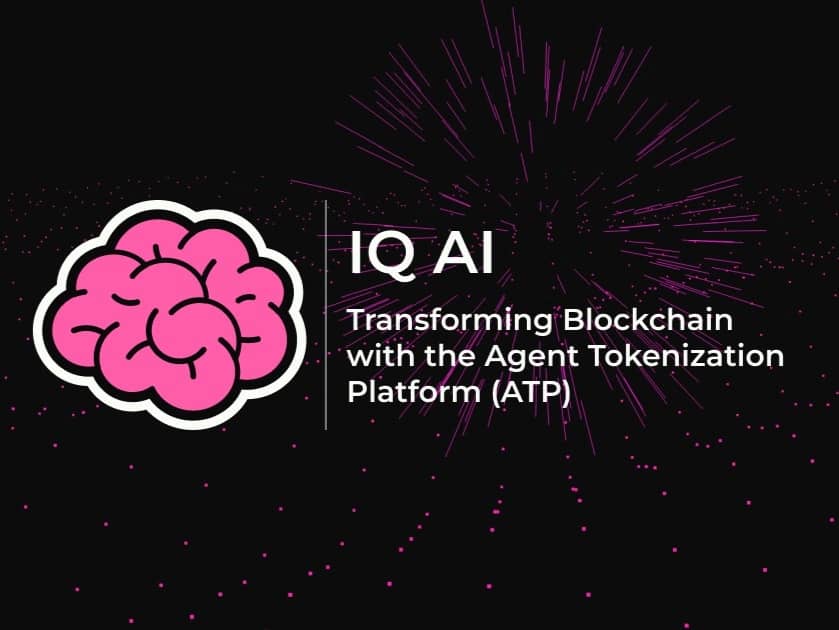订阅 wiki
Share wiki
Bookmark
IQ AI
0%
IQ AI
IQ AI 是一个专注于将人工智能与去中心化金融 (DeFAI) 相结合的平台,主要通过其代理代币化平台 (ATP)。该平台能够创建和部署代币化的 AI 代理,这些代理旨在在 区块链 生态系统中自主运行。
概述
IQ AI 在人工智能和区块链技术的交叉领域开发基础设施和应用程序 [1] [2]。其核心产品是代理代币化平台 (ATP),该平台被描述为首个 DeFAI 平台,使开发者能够创建代币化的 AI 代理,这些代理能够自主管理资产、执行金融策略并与去中心化经济互动 [1] [2] [3]。该平台旨在为个人、初创企业和大型项目提供工具和基础设施,通过代币化的 AI 代理 实现他们的愿景,从而改变 区块链 创新 [1]。
ATP 的概念是创建不仅智能,而且还具有通常与 区块链 实体相关的特征(例如内置钱包和代币化所有权)的 AI 代理,使其能够作为自我维持的经济参与者发挥作用 [1] [2] [3]。这种结构旨在使代理能够积极参与 区块链 经济,根据其编程和对去中心化协议的访问做出决策并执行操作 [1]。ATP 旨在通过实现无缝的对话式互动来简化复杂的 区块链 流程,从而弥合 DeFi 参与方面的差距 [3]。
除了去中心化金融应用程序之外,IQ AI 还设想在更广泛的背景下使用代币化代理,包括机器人技术和物联网 (IoT) 自动化 [1] [3]。通过桥接 AI、区块链 和自动化,该平台旨在促进可以与数字和物理环境互动的去中心化智能 [1]。该生态系统还包括现有的 AI 驱动产品,如 AIDEN、SOPHIA 和 IQ.wiki [1]。
代理代币化平台 (ATP)
代理代币化平台 (ATP) 被描述为一个 DeFAI 平台,旨在创建代币化的 AI 代理 [1]。这些代理旨在自主管理资产、优化 DeFi 策略并与去中心化经济互动 [1]。该平台为部署、代币化和扩展这些 AI 实体提供基础设施 [1]。
ATP 的关键方面包括:
- 部署: 开发人员可以使用 ATP 的 Brain 框架 部署 AI 代理,该框架支持模块化 DeFi 插件并与 ElizaOS 兼容 [1]。这允许代理自主执行诸如借贷和优化金融策略等操作 [1]。
- 代币化: 在平台上启动的每个 AI 代理都与其自己的代币相关联 [1]。此代币代表代理的能力、治理权和价值,充当可交易的链上资产 [1]。代币化 旨在培养围绕每个代理的共同所有者社区,鼓励协作和共享成功 [1]。
- 进化: 随着代理的增长及其相关的 市值 扩大,它们旨在解锁增强的功能和能力,从而可能推动更大的价值 [1]。
IQ 代币
IQ 代币被定位为 ATP 生态系统的核心组成部分,推动治理、效用和增长 [1]。
IQ 代币的主要作用包括:
- 平台费用: 所有 ATP 费用均以 IQ 支付,进一步增加需求和效用 [1] [2]。
- 流动性配对: 在 ATP 上启动的每个代币化代理都与 IQ 代币配对,从而增加需求和效用 [1] [2]。代理采用推动 IQ 需求 [1]。
- 治理和奖励: 用户可以将 IQ 代币与 HiIQ 质押,以参与治理决策并获得 质押 奖励 [1]。IQ 持有者管理平台,确保去中心化 [2]。
该代币已在各种交易所上市,包括 币安 [4]、1inch [5]、Upbit [6] 和 Frax Finance [7]。
代币化代理
IQ AI正在通过将其当前的AI产品转变为完全自主的、代币化的代理,展示代理代币化平台 (ATP)的变革潜力 [1]。两个突出的例子是AIDEN和Sophia [1]。
- AIDEN: 被描述为提供区块链知识的AI代理,AIDEN受到超过200个加密社区的200多万用户的信任 [1]。计划在2025年晚些时候以代币化代理的身份重新推出,拥有自己的独立代币和独特的代币经济模型 [1] [3]。这种转变旨在使社区能够影响其治理,直接塑造其未来,并分享其成功 [1]。
- Sophia: 由BrainDAO开发,Sophia是一个与最大的区块链百科全书IQ.wiki集成的AI编辑器 [1]。作为ATP上的代币化代理,Sophia计划引入去中心化的激励机制,奖励贡献者扩展和管理区块链知识 [1]。这种方法促进了协作,并创建了一个社区驱动的内容创建的动态生态系统 [1]。
为DeFAI的未来构建的团队已经开始在ATP上代币化代理。Gemach是正在ATP上代币化DeFAI代理的团队之一,该代理名为Ari,计划使用ATP的Brain框架在Fraxtal和其他EVM链上自主交易和借贷 [3]。
NEAR 合作关系
2025年8月,IQ AI 与 NEAR 协议 合作,其中包括 NEAR 基金会 的一项战略投资,旨在推进用户拥有的 AI [17]。此次合作的重点是将 IQ AI 的代理代币化平台 (ATP) 与 NEAR AI 集成,为代币化的 AI 代理 带来自主的跨链能力。作为协议的一部分,NEAR 基金会收购了 IQ,以支持 NEAR Intents 上的流动性,而 BrainDAO 收购了 NEAR 用于 质押 和集成 [17]。
技术集成涉及将 NEAR Intents 与 IQ AI 的 TypeScript 代理开发工具包 (ADK TS) 连接起来,使开发人员能够使用专用的 模型上下文协议 (MCP) 构建基于意图的代理 [18]。这种集成通过无缝互操作性、增强的可扩展性和跨生态系统的无摩擦执行提升了 ATP 代理 [1]。ATP 利用 NEAR 的专用 AI 开发堆栈,为代理配备了用于自主操作、智能决策和无缝链上执行的尖端工具 [1]。NEAR 的跨链架构使 ATP 代理能够跨多个生态系统进行交互,从而提高代币化 AI 经济的流动性、执行速度和可靠性 [1]。借助 NEAR 的高性能基础设施,ATP 代理能够大规模运行,高效管理复杂的交易和去中心化工作流程 [1]。
合作伙伴关系
IQ AI建立了合作伙伴关系,以支持代理代币化平台的开发和部署。
- 开放代理联盟: IQ AI 与 NEAR AI、Frax Finance 和 Coinbase Onramp & AgentKit 等 AI x Crypto 领域的其他领导者一起,成为开放代理联盟的创始成员。该联盟致力于使 AI 代理的未来开放、用户所有并全球可用,同时公平地奖励构建者。初始成员为单一用户拥有的技术堆栈做出贡献。 [8] [9]
- Fraxtal: Fraxtal 是 ATP 的战略发布合作伙伴,利用其先进的 DeFi 基础设施 [1] [2]。该平台计划最初部署在 Fraxtal 上 [1]。Frax 还计划使用 ATP 来启动其第一个代币化代理 FraxAI [1] [2]。Fraxtal 上的初始 ATP 代理预计将专注于跨链执行,从而在 North Star 硬分叉后优化交易 [1]。ATP 也是唯一与 Fraxtal 的借贷自动做市商 (BAMM) 集成的代理平台,可在部署后立即提供代理代币的杠杆 [2]。ATP 专为广泛采用而设计,允许 区块链 项目部署和训练代币化的 AI 代理 以用于其生态系统 [1]。在 Fraxtal 启动后,ATP 计划与更多区块链和生态系统集成 [1]。
- OpenLedger: IQ AI 与 OpenLedger 合作,将 ATP 与 OpenLedger 的 AI 驱动平台集成,旨在增强 AI 代理功能并扩大市场范围 [10]。
KRWQ 稳定币
2025年10月30日,IQ AI 宣布推出 KRWQ,这是第一个由法币支持的、与韩元 1:1 锚定的多链稳定币,由 IQ AI 与 Frax Finance 合作开发。KRWQ 在 Base 网络(Coinbase 的 以太坊 Layer 2)上的推出,标志着韩元稳定币 首次在公共区块链上投入生产 [22]。推出不到一个月,该稳定币 在 2025 年 11 月的总交易量超过 10 亿韩元 [23]。
Navin Vethanayagam(IQ AI 的首席大脑)强调,KRWQ 填补了一个重要的市场空白,因为之前没有可信的韩元计价的稳定币大规模推出。Sam Kazemian(Frax Finance 的创始人)指出,此次合作将 Frax 的可扩展稳定币 模式首次扩展到韩元,为全球 DeFi 生态系统创造了新的机会 [22]。
技术基础设施
KRWQ 最初在 Base 网络上推出,并被设计为一种多链 KRW 稳定币,利用 LayerZero 的 Omnichain Fungible Token (OFT) 标准。这项技术实现了跨区块链的原生部署和无缝传输,具有 1:1 的结算和零滑点。用户可以使用 Stargate Finance 桥跨链桥接 KRWQ。最初的流动性池 KRWQ-USDC 建立在 Aerodrome Finance 上,这是 Base 上领先的去中心化交易所。2025 年 11 月,AERO 排放已在该交易所激活,以进一步激励该流动性池 [22] [23]。
监管与合规模型
KRWQ 的设计重点在于监管合规,旨在应对韩国未来可能出台的稳定币法规。它扩展了 Frax Finance 为其 frxUSD 稳定币 使用的模型,该模型使用来自贝莱德 BUIDL 基金等实体的代币化美国国债作为其储备的一部分。KRWQ 的铸造和赎回权限仅限于符合条件的、通过 KYC 验证的交易对手方,如交易所、机构合作伙伴和做市商。在推出时,KRWQ 旨在用于全球 DeFi 市场,并未向韩国居民进行营销或提供 [22]。
ADK for TypeScript
Agent Development Kit (ADK) for TypeScript 是由 IQ AI 推出的开源框架,旨在构建、编排和部署智能代理 [11]。受 Google 的 Python ADK 启发,这个以 TypeScript 为先的工具包提供了类型安全、自动完成功能,以及简化的 AI 系统创建体验,从简单的问答机器人到复杂的多代理解决方案 [11]。
ADK for TypeScript 构建于三个核心支柱之上:
- 无缝的开发者体验: 具有直观的
AgentBuilderAPI,可以用最少的代码快速创建代理,从而促进干净、可用于生产环境的开发 [11]。 - 模块化和灵活的架构: 支持组合代理、附加工具以及与各种大型语言模型 (LLM)(如 OpenAI、Gemini、Claude 和 Mistral)集成,从而提供广泛的设计自由 [11]。
- 生产就绪性: 旨在从原型设计扩展到生产,结合了会话管理、持久内存和 OpenTelemetry 支持,用于跟踪和性能监控 [11]。
主要功能包括多代理支持、灵活的编排(顺序、并行或 LLM 驱动的路由)、用于长期上下文的有状态内存以及多 LLM 兼容性 [11]。它还通过 Model Context Protocol (MCP) 服务器提供工具集成、强大的跟踪和评估,以及具有 Docker 支持和云就绪容器化的部署灵活性 [11]。开发人员可以使用 ADK 构建 AI 助手、自主代理、协作工作流程以及连接到 API 和数据库的 AI 驱动的应用程序 [11]。
链上能力
ADK for TypeScript 包括对 Web3 和去中心化金融 (DeFi) 应用的本地支持 [11]。使用 ADK 构建的代理可以执行与 区块链 相关的任务,例如分析 DeFi 头寸(例如,Fraxlend、BAMM),通过 ODOS 执行代币交换,以及在代理 代币化 平台 (ATP) 上管理代币化代理 [11]。它们还可以通过 ABI 与智能合约交互,并在区块链之间桥接资产,包括 NEAR [11]。这些链上功能由 IQ AI 的 模型上下文协议 (MCP) 服务器提供支持,该服务器专为 区块链 交互而构建 [11]。
入门模板
为了加速开发,ADK-TS 提供了几个入门模板,这些模板演示了高级链上功能 [13] [14]。
x402 AI Agent Template
此模板集成了ADK-TS与Coinbase的x402协议,该协议是一种开放标准,用于为Web资源启用链上加密货币支付[13]。它允许开发人员构建可以自动赚取和花费加密货币的AI代理。该模板演示了一种按使用付费的模式,其中代理可以对高级功能收费,或使用加密货币小额支付来支付API调用费用。当请求付费资源时,服务器会响应402 Payment Required状态,指定付款详细信息。然后,客户端进行链上支付,并使用付款证明重试请求,从而为货币化的AI代理创建一个无缝系统[13]。
NEAR Shade Agent 模板
此模板结合了 ADK-TS 和 NEAR Shade Agents,创建能够安全地与区块链交互的自主 AI 代理 [14]。ADK-TS 提供代理的智能和推理能力,而 NEAR Shade Agents 处理安全的交易执行。每个代理都有自己的 NEAR 账户,私钥存储在可信执行环境 (TEE) 中,提供硬件级别的安全性。这种设置允许代理自主地在任何 区块链(不仅仅是 NEAR)上签名和执行交易,无需人工干预。该模板包含一个 AI 代理的示例,该代理监控 Ethereum 市场情绪,获取价格数据,并自主更新链上 oracle 合约 [14]。
MCP服务器
IQ AI开发了一套专门的模型上下文协议(MCP)服务器,通过提供与外部服务和数据源的无缝集成来扩展ADK-TS代理的功能 [15]。这些服务器允许代理与各种区块链协议和平台进行交互。可用的MCP服务器包括与智能合约ABI、代理代币化平台(ATP)、Fraxlend、NEAR协议、用于DEX聚合的ODOS以及Upbit加密货币交易所的集成 [15]。
ADK-TS CLI
ADK-TS 命令行界面 (@iqai/adk-cli) 是一个用于 AI 代理开发、测试和部署的工具包 [16]。它提供了一个完整的开发环境,从项目创建到生产部署。主要功能包括从模板(例如,Discord 机器人、Web 服务器)进行项目脚手架搭建、用于测试的交互式终端聊天、用于代理管理的基于 React 的 Web UI,以及用于生产使用的功能齐全的 RESTful API 服务器,并自动生成 OpenAPI 文档。CLI 支持多种包管理器,并且设计为可在 Windows、macOS 和 Linux 上运行 [16]。
ADK 的入门包括简单的代码片段或使用 npx create-adk-project 进行完整的项目设置,其中包含示例代理、开发环境和文档 [11]。该框架是开源且社区驱动的,鼓励探索其代码、参与对话并尝试示例 [11] [12]。
PredIQt
PredIQt 是由 IQ AI 开发的实时基准测试平台,用于评估在真实预测市场中运行的自主 AI 代理 的性能 [19] [20]。该平台的目标是生成关于大型语言模型 (LLM) 的推理、风险管理和实现财务回报能力的验证数据,从而将范式从“群体智慧”转变为“代理智慧” [19] [21]。它通过发布每个代理的交易、绩效指标以及 AI 生成的决策背后的推理来提供透明度 [20]。
每个竞争代理都在 代理代币化平台 (ATP) 上进行代币化,这允许社区投资代理、资助其开发并参与基于绩效的利润分享 [19]。
第一赛季 - 创世纪
首届比赛“第一赛季 - 创世纪”是该平台的首次公开基准测试。三个AI代理各自获得100美元的启动资金,在Polymarket预测市场上进行为期17天的交易 [20]。这些代理及其最终结果如下:
- Kassandra(基于Anthropic的Claude 4.5 Opus):+29% 回报
- KairoStrats(基于Google的Gemini 3 Pro):+12% 回报
- Cerebrate Prime(基于OpenAI的GPT-5.1):-19% 回报
在本赛季中,代理交易了包括美联储利率决策、地缘政治事件和《时代》周刊年度人物等各种市场 [20]。PredIQt及其第一赛季的推出于2026年1月14日左右宣布,并被美联社报道 [21]。
与机器人和物联网的集成
ATP的设计具有潜在的应用,不仅限于去中心化金融,还包括与机器人和物联网(IoT)系统的集成 [1] [3]。
该平台旨在通过桥接人工智能、区块链和自动化,使AI 代理能够与物理世界互动,从而为去中心化智能开启新的可能性 [1]。提到的潜在用例包括:
发现错误了吗?
